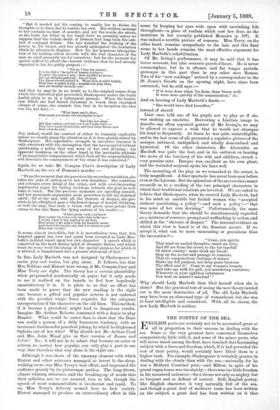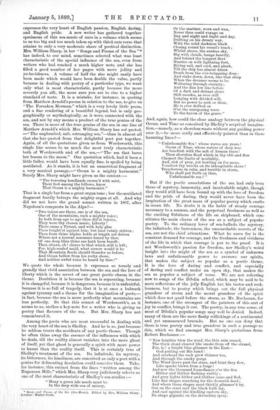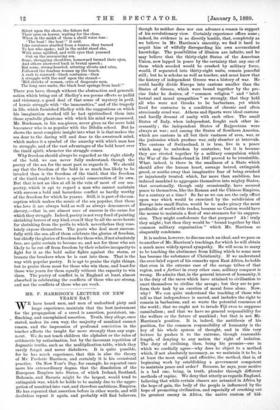THE POETRY OF THE SEA.
'ENGLISH poets are certainly not to be accounted great at
all in proportion to their success in dealing with the sea. Some cu. the very greatest have concerned themselves comparatively little with it, and some of the minor poets, who will never stand among the first, have touched that fascinating subject with a force and freedom, which, if it had pervaded the rest of their poetry, would certainly have lifted them to a higher rank. For example, Shakespeare is certainly greater in dealing with the clouds than with the sea,—naturally, for he was a Midland Counties' poet,—and Milton, in spite of his grand organ tones, was too stately,—there was too little freedom in his measured cadences,—for a theme not only so mighty, but so buoyant and so defiant of control. Still. English poetry, like English character, is very naturally full of the sea, and though a great deal of mediocre verse has been written on the subject, a great deal has been written on it that expresses the very heart of English passion, English daring, and English pride. A new writer has gathered together specimens of this sea-music of ours in a volume which seems to us too big and too much taken up with third-rate verse that attains to only a very moderate share of poetical distinction.
Mrs. William Sharp, in her "Songs and Poems of the Sea "* has indeed, to our mind, sometimes selected what was least characteristic of the special influence of the sea, even from writers who had reached a much higher note, and she has filled a good number of her pages with mere jollity and yo-ho-ishness. A volume of half the size might easily have been made which would have been double the value, partly because in dealing with poetry of a particular type, we want only what is most characteristic, partly because the more severely you sift, the more sure you are to rise to a higher standard of taste. It is a mistake, for instance, in quoting from Matthew Arnold's poems in relation to the sea, to give us "The Forsaken Merman," which is a very lovely little poem, and a fine rendering of a beautiful legend, but is only geo- graphically or mythologically, as it were, connected with the
sea, and not by any means a product of the true genius of the sea. There is more of the true genius of the sea in one line of Matthew Arnold's which Mrs. William Sharp has not quoted,
—" The unplumbed, salt, estranging sea,"—than in almost all that she has quoted from that delightful poet put together. Again, of all the quotations given us from Wordsworth, this single line seems to us much the most truly characteristic both of Wordsworth and of the sea,—" The sea that bares her bosom to the moon." One quotation which, had it been a little fuller, would have been equally fine, is spoiled by being mutilated. As it stands, it is but an unmetrical fragment of a very musical passage,—" Ocean is a mighty harmonist." Surely Mrs. Sharp might have given us the context :—
" The towering headlands crovirn'd with mist, Their feet among the billows, know That Ocean is a mighty harmonist."
That is a single bar from a great organ tune ; but the mutilated fragment hardly betrays the mighty organ at all. And why did we not have the grand sonnet written in 1807, after Napoleon's conquests in the Alps P-
" Two voices are there, one is of the sea, One of the mountains, each a mighty voice ; In both from age to age thou did'st rejoice, They were thy chosen music, Liberty !
There came a Tyrant, and with holy glee Thou fought'st against him; but hast vainly striven : Thou from thine Alpine holds at length art driven Where not a torrent murmurs heard by thee.
Of one deep bliss thine ear hath been bereft : Then cleave, oh ! cleave to that which still is left; For, high-souled maid, what sorrow would it be That Mountain floods should thunder as before, And Ocean bellow from his rocky shore, And neither awful voice be heard by thee !"
We quote the whole because it expresses so tersely and grandly that vivid association between the sea and the love of liberty which is the secret of one great poetic charm in the theme. Doubtless it is because the sea is separating, because
it is changeful, because it is dangerous, because it is unfruitful, because it is so full of tragedy, that it is at once a bulwark against tyranny and a theme for the imagination of poets,— in fact, because the sea is more perfectly what mountains are less perfectly. So that this sonnet of Wordsworth's, as it seems to us, strikes a key-note for a writer who is giving us poetry that flavours of the sea. But Mrs. Sharp has not remembered it.
Among the poets who are most successful in dealing with the very heart of the sea is Shelley. And he is so, just because he seldom treats the accidents of any poetic theme. Though he often thins away the essence of the influences with which he deals, till the reality almost vanishes into the mere ghost of itself, yet that ghost is generally a spirit with more power to haunt than the reality itself. This is certainly true of Shelley's treatment of the sea. Its infinitude, its mystery, its bitterness, its loneliness, are conceived as only a poet with a genius for delineating desolation could conceive them. Take, for instance, this extract from the lines "written among the Euganean Hills," which Mrs. Sharp very judiciously selects as one of the most characteristic of Shelley's sea-studies :—
"Many a green isle needs must be In the deep wide sea of misery, • Song' and Poems of the Sea (Sea-Music). Edited by Mrs. William Sharp. London: Walter Scott.
Or the mariner, worn and wan, Never thus could voyage on Day and night and night and day, Drifting on his dreary way, With the solid darkness black Closing round his vessel's track ; Whilst above, the sunless sky, Big with clouds, hangs heavily, And behind the tempest fleet Hurries on with lightning feet, Riving sail, and cord, and plank, Till the ship has almost drank Death from the o'er-brimming deep ; And sinks down, down, like that sleep When the dreamer seems to bo Weltering through eternity; And the dim low line before Of a dark and distant shore Still recedes, as ever still Longing with divided will, But no power to seek or shun, He is ever drifted on O'er the unreposing wave To the haven of the grave."
And, again, how could the close analogy between the physical Ocean, and Time as conceived by Shelley's sceptical imagina- tion,—namely, as a shoreless waste without any guiding power over it,—be more eerily and effectively painted than in these haunting lines P-
" Unfathomable Sea! whose waves are years !
Ocean of Time, whose waters of deep woe Are brackish with the salt of human tears !
Thou shoreless flood which in thy ebb and flow Clasped the limits of mortality, And, sick of prey, yet howling on for more, Vomitest thy wrecks on its inhospitable shore ! Treacherous in calm, and terrible in storm, Who shall put forth on thee, Unfathomable sea ? "
But if the poetic associations of the sea had only been those of mystery, immensity, and incalculable might, though they would still have been bound up with the love of freedom and the pride of daring, they would never have been the inspiration of the great mass of popular poetry which exults in ocean life. No doubt it is the habit of steady courage necessary to a seaman, and the perpetual freshness as well as the exciting fitfulness of the life on shipboard, which con- stitutes the main charm of the sea as a subject of popular poetry. To the ordinary lover of sea-ballads, the mystery, the infinitude, the barrenness, the unsearchable secrets of the sea, are not the chief attractions. What he cares for is the constant demand for courage, and the freshness and vividness of the life in which that courage is put to the proof. It is not Wordsworth's passion for freedom, nor Shelley's weird insight into the might of the sea as a symbol of unknown laws and unfathomable power to overawe our spirits, that makes the subject so popular as a poetic theme. It is the love of daring and conflict, and especially of daring and conflict under an open sky, that makes the sea so popular a subject of verse. We are not referring now to songs of the Dibdin school, which may be said to be mere reflections of the jolly English tar, his tastes and reck- lessness, but to poetry which brings out the full physical grandeur of storm and the moral grandeur of the spirit which does not quail before the storm, as Mr. Buchanan, for instance, one of the strongest of the painters of this sort of joy in conflict, brings it out. The poetry, in any true sense, of most of Dibdin's popular songs may well be denied. Indeed, many of them are the mere flashy rollickings of a sentimental and yet unmeasured bravado. But no one can deny that there is true poetry and true grandeur in such a passage as this, which we find amongst Mrs. Sharp's quotations from Robert Buchanan :— "Now faintlier blew the wind, the thin rain ceased,
The thick cloud cleared like smoke from off the strand,
For, lo ! a bright blue glimmer in the East—
God putting out His hand ! And overhead the rack grew thinner too, And through the smoky gorge The Wind drave past the stars, and faint they flew, Like sparks blown from a forge !
And now the thousand foam-flames o'er the Sea Hither and thither flashing visibly ; And grey lights hither and thither came and fled, Like dim shapes searching for the drowned dead ; And where these shapes most thickly glimmer'd by, Out on the cruel reef the black hulk lay, And cast against the kindling eastern sky, Its shape gigantic on the shrouding spray. Silent upon the shore, the fishers fed Their eyes on horror, waiting for the close, When in the midst of them a shrill voice rose : 'The boat ! the boat !' it said.
Like creatures startled from a trance, they turned To her who spake ; tall in the midst stood she, With arms uplifted, and with eyes that yearned Out on the murmuring sea.
Some, shrugging shoulders, homeward turned their eyes, And others answered back in brutal speech ; But some, strong-hearted, uttering shouts and cries, Followed the fearless woman up the beach.
A rush to seaward—black confusion—then
A struggle with the surf upon the strand—
'Mid shrieks of women, cries of desperate men, The long oars smite, the black boat springs from land !"
There you have, though without the abstraction and generali- sation which bring out of Shelley's sea-poems effects so pallid and visionary, a good deal of that sense of mystery in peril, of heroic struggle with "the immensities," and of the tragedy in life, which furnished Shelley with the suggestions on which his imagination worked till he had spiritualised them into those symbolic phantoms with which his mind was possessed.
Mr. Buchanan, in his sea-pieces, never gives us the mere bold buccaneer who is so popular with the Dibdin school. But he shows the most complete insight into what it is that makes the sea dear to the daring will and dear to the awestruck mind, which makes it a symbol of the anarchy with which man has to struggle, and of the vast advantages of the bold heart over the timid spirit, whenever the struggle comes.
Why freedom should always be regarded as the right chiefly of the bold, we can never fully understand, though the poetry of the sea for the most part so regards it. We should say that the freedom of the bold is so much leas likely to be invaded than is the freedom of the timid, that the freedom of the timid ought to have a special consecration of its own. But that is not an idea at all in the vein of most of our sea- poetry, which is apt to regard a man who cannot maintain with success a bold and hazardous conflict as hardly worthy of the freedom for which he yearns. Still, it is part of the con- ception which makes the music of the sea popular, that those who love it are always bold as well as always denouncers of slavery,—that is, are almost sure of success in the cause for which they struggle. Indeed, poetry is not very fond of painting shrinking heroes of any kind, even if they be all the more heroic for shrinking from the perils to which nevertheless they reso- lutely expose themselves. The poets who deal most success- fully with the sea, all of them celebrate the glories of freedom,
but chiefly the glories of freedom for those who, if not absolutely free, are quite certain to become so, and not for those who are
likely to be cut off from freedom by their relative incapacity to fight for it as the bold sailor fights against the storm, or breasts the breakers when he is cast into them. That is the way with popular poetry. It is apt to praise the right things, but to praise them most for those who win them, and least for those who yearn for them equally without the capacity to win them. The poetry of conflict is, in England at least, almost absorbed in celebrating the conflicts of those who are strong, and not the conflicts of those who are weak.
















































 Previous page
Previous page